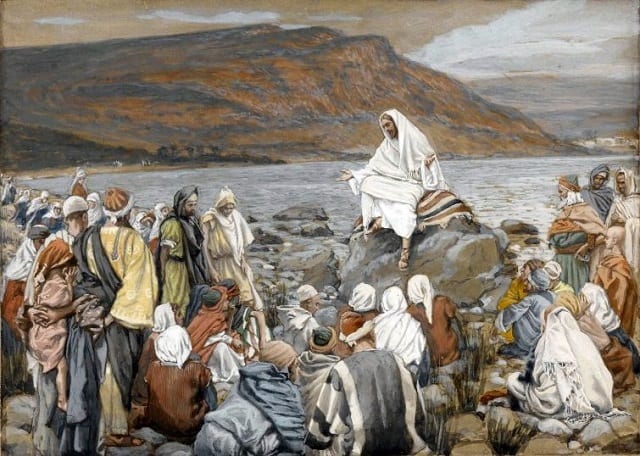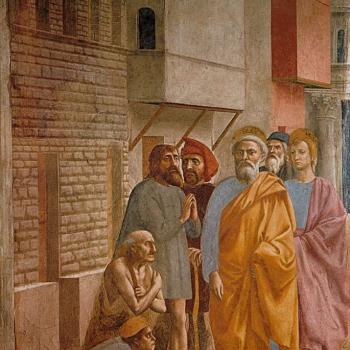
John 6:60-67 (RSV) Many of his disciples, when they heard it, said, “This is a hard saying; who can listen to it?” [61] But Jesus, knowing in himself that his disciples murmured at it, said to them, “Do you take offense at this? [62] Then what if you were to see the Son of man ascending where he was before? [63] It is the spirit that gives life, the flesh is of no avail; the words that I have spoken to you are spirit and life. [64] But there are some of you that do not believe.” For Jesus knew from the first who those were that did not believe, and who it was that would betray him. [65] And he said, “This is why I told you that no one can come to me unless it is granted him by the Father.” [66] After this many of his disciples drew back and no longer went about with him. [67] Jesus said to the twelve, “Do you also wish to go away?”
As I will argue in this paper, Catholics contend that these “disciples” (Jn 6:66) left because they refused to accept Jesus’ explicit teaching about the real presence and transubstantiation, with regard to the sacrament of the Holy Eucharist. Many Protestants, on the other hand, contend (among other things) that they misunderstood His teaching, and therefore left Him. I will address the utter inadequacy of the explanations of many Protestant commentaries in interpreting this passage.
This methodology was used in my book, The Catholic Verses: 95 Bible Passages That Confound Protestants (2004). See its introduction (included with the book link) for further elaboration on that. The book is about Protestant special pleading and eisegesis (improperly reading into scriptural passages what isn’t there) when they come across biblical passages that plainly teach distinctively Catholic doctrine and contradict their own.
1) “Generic Gospel” Explanation
Many may be expected to be offended by the doctrines of the gospel. Having no spirituality of mind, and really understanding nothing of the gospel, they may be expected to take offence and turn back. . . . We should honestly inquire whether we have been led to make a profession of religion by the hope of any temporal advantage, by any selfish principle, or by mere excited animal feeling. (Barnes’ Notes)
Such is the malice of men, that they bring about their own destruction, even in hearing the very doctrine of salvation, . . . (Geneva Study Bible)
There is seen in this Gospel a continual departure and a deepening faith. (Pulpit Commentary)
He again states that faith is an uncommon and remarkable gift of the Spirit of God, that we may not be astonished that the Gospel is not received in every place and by all. For, being ill qualified to turn to our advantage the course of events, we think more meanly of the Gospel, because the whole world does not assent to it. . . . no man, whatever may be his acuteness, can arrive at faith by his own sagacity; for all are blind, until they are illuminated by the Spirit of God, and therefore they only partake of so great a blessing whom the Father deigns to make partakers of it. (Calvin’s Commentaries)
This discourse is not about the gospel of God’s saving grace itself, or the gospel per se. Rather, it’s centered on the Holy Eucharist: as, assuredly, a key means to salvation and eternal life, but still only related to transubstantiation. It’s clear that these disciples were rejecting that specific aspect of Jesus’ teachings. These commentaries refuse to deal with this plain fact in the text.
2) “Temporal King / Powerful Messiah” Explanation
[T]hey withdrew themselves from his ministry, they dropped their profession of faith in him, and relinquished him as a Saviour and Redeemer: for finding that he would not be made king, nor set up for a temporal redeemer; . . . (Gill’s Exposition of the Entire Bible)
[They left] on this account, because of these words of Jesus, John 6:61 ff., which so thoroughly undeceived them as regarded their earthly Messianic hopes. (Meyer’s NT Commentary)
Probably there is a general reference to their carnal ideas about the Messiah: it is “in our Lord’s refusal to assume the outward insignia of the Messianic dignity, and in His persistent spiritualisation of the Messianic idea” that we must seek “the ultimate cause” of the defection of so many disciples. (Cambridge Bible for Schools and Colleges)
Great crowds are following Him to be healed and to be fed, while the politically inclined have at last made a distinct effort to make Him a king, to force Him into a collision with the authorities. His proper work is in danger of being lost sight of. He finds it necessary to sift the crowds who follow Him. And He does so by addressing them in terms which can be acceptable only to truly spiritual men-by plainly assuring them that He was among them, not to give them political privileges and the bread that perisheth, but the bread that endureth. They found Him to be what they would call an impracticable dreamer. They profess to go away because they cannot understand Him; but they understand Him well enough to see He is not the person for their purposes. They seek earth, and heaven is thrust upon them. (Expositor’s Bible Commentary)
Meyer, more correctly, . . . On account of this discourse, “which disappointed their carnal messianic hopes.” (Lange Commentary)
These commentaries miss the overall point, as the text / discourse was also not about Jesus refusing to be a king or “temporal redeemer.” The explicit clue in the text regarding what was disputed and disbelieved is John 6:52: “The Jews then disputed among themselves, saying, ‘How can this man give us his flesh to eat?’ ” That was being disputed and rejected by those who decided to leave.
3) Non-Eucharistic Explanation
When he says, the flesh of the Son of man, the expression is emphatic; for he reproves them for their contempt, which arose from perceiving that he resembled other men. The meaning therefore is: “Despise me as much as you please, on account of the mean and despicable appearance of my flesh, still that despicable flesh contains life; and if you are destitute of it, you will nowhere else find any thing else to quicken you.” The ancients fell into a gross error by supposing that little children were deprived of eternal life, if they did not dispense to them the eucharist, that is, the Lord’s Supper; for this discourse does not relate to the Lord’s Supper, but to the uninterrupted communication of the flesh of Christ, which we obtain apart from the use of the Lord’s Supper. (Calvin’s Commentaries)
Dr. John Lightfoot . . . showed that “eating” and “drinking” were used by Jesus metaphorically, . . . (William Kelly)
It is the spirit that quickeneth – It is the spiritual sense only of my words that is to be attended to, and through which life is to be attained, 2 Corinthians 3:6. Such only as eat and drink what I have mentioned, in a spiritual sense, are to expect eternal life. The flesh profiteth nothing – If ye could even eat my flesh and drink my blood, this would not avail for your salvation. These words contain a caution that the hearers should not understand his words in the strict literal sense, as if his body were really Bread, and as if his flesh and blood were really to be eaten and drank. . . . our Lord’s words here do not refer to any new point of doctrine which he was then inculcating, but to what he had spoken concerning his being the living bread, and concerning the eating of his flesh, and drinking of his blood, in the preceding verses. (Adam Clarke)
It is a wonderful discourse on His incarnation, His sacrificial, atoning death, and the blessed assurances given to those who believe on Him. (Gaebelein’s Annotated Bible)
Many of these commentaries imply that Jesus was frequently misunderstood, and usually didn’t correct people’s misperceptions. Thus, they contend that John 6 is an instance of Jesus was merely speaking metaphorically (which His hearers didn’t grasp).
But it’s untrue that Jesus didn’t correct misunderstandings. He did on many recorded occasions; for example: John 3:1-15 (Nicodemus and the meaning of “born again”), Matthew 13:36-51 (explanation of the parable of the tares), Matthew 15:10-20 (what defiles a man), Matthew 16:5-12 (metaphorical use of leaven), Matthew 17:9-13 (parallel of Elijah and John the Baptist), Matthew 19:24-26 (camel through the eye of a needle and rich men), Mark 4:33-34 and Luke 8:9-15 (meaning of parables in general), Luke 24:13-27 (Jesus’ teaching about Himself to the two disciples on the road to Emmaus), John 4:31-34 (metaphorical meaning of meat), John 8:21-32 (His own divinity), John 10:1-9 (parable of the Good Shepherd), and John 11:8-15 (sleep as symbolic of death). Another example is the entire Chapter 16 of John, where the disciples did not understand, and Jesus explained at length to clarify, and then they did understand.
Yet Jesus did not explain in this instance; He merely repeated with more force. And it is the only recorded instance (other than Judas) of any of His disciples ceasing to follow Him. The plausible reason is because He knew that they were questioning and would not have accepted any further explanation anyway. We know this from the hard evidence of John 6:64: “Jesus knew from the first who those were that did not believe”.
This theme appears elsewhere in John, too (see 8:27, 43-47; 12:37-40). Jesus is emphasizing that some people don’t “understand” because they don’t want to: they lack faith; they can’t “bear” His word, and they are burdened with undue skepticism and led by the devil, the father of lies. This is what happened in John 6 with those disciples who left Him. It’s a theme in the Synoptic Gospels as well (see Matt 13:13, 19; Lk 5:21-22).
Jesus often explained and corrected His disciples who misunderstood and who were willing to listen. Therefore, John 6 makes sense only in terms of interpreting it as an instance where it was not an innocent misunderstanding (mistaking a supposed figurative discourse for a literal one), but rather, a deliberate refusal to believe (understanding but not accepting).
The argument hinges on the clear distinction between how Jesus talked to open-minded and closed-minded people, and between how He talked to disciples and the masses. It’s beyond ludicrous to think that Jesus would have allowed anyone to stop being His disciple based on a misunderstanding of supposed figurative or symbolic language for literal. He would have corrected them.
Not explaining because He knew it would be futile is perfectly consistent with His behavior in other such scenarios. The disciples were constantly misunderstanding Jesus, and He corrected and educated them over and over. We know that Jesus thought this about them because of what He said: “Do you take offense at this?” (John 6:61; meaning, of course, that they did, because He knew their hearts).
Language of not believing and betrayal doesn’t apply to misunderstandings. Therefore, it makes no sense to think that He let them stop being His disciples based on a supposed misunderstanding. Jesus tells His disciples what His parables mean, but not the larger crowds. This is explicitly stated in Matthew 13:10-11 and Luke 8:9-10. And note that the “disciples” were not just the Twelve, but included also at least the “seventy” mentioned in Luke 10:1 ff.: sent out to preach the gospel and heal the sick (10:9) and to cast out demons (10:17).
Jesus “rejoiced” upon their enthusiastic report and thanked His Father, “that thou hast hidden these things from the wise and understanding and revealed them to babes . . .” (10:21): language quite similar to the parables being understood by disciples and not all the masses at large.
Therefore, He would surely have revealed this teaching to these disciples who deserted Him if they had merely misunderstood it. But He did not, because He knew that they understood, but were hardhearted. What they rejected was eucharistic realism. It requires more faith than symbolism or mystical, spiritual presence. They didn’t yet have it, and they decided not to try to stick around in order to get it. They had had enough.
Let us pray that we never fall into this grave error.
***
Related Reading
Debate with a Protestant on John 6 & the Eucharist (vs. C. Michael Patton) [12-4-08]
John 6, the Eucharist, & Parables (Dialogue) [8-16-09]
Did Jesus’ “Hard Saying” (Jn 6) Make Disciples Leave? [3-5-19]
***
Photo credit: Jesus Teaches the People by the Sea, by James Tissot (1836-1902) [public domain / Wikimedia Commons]
***












